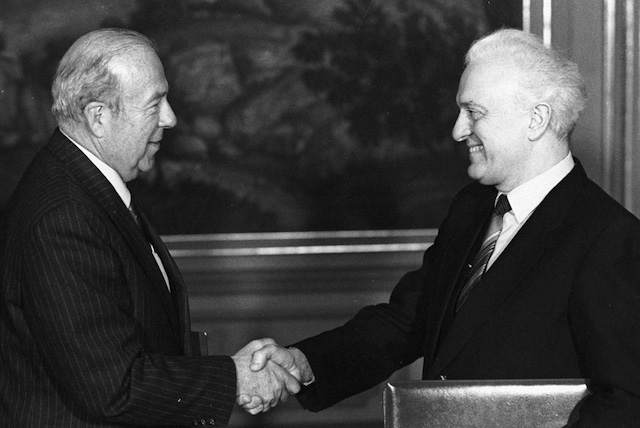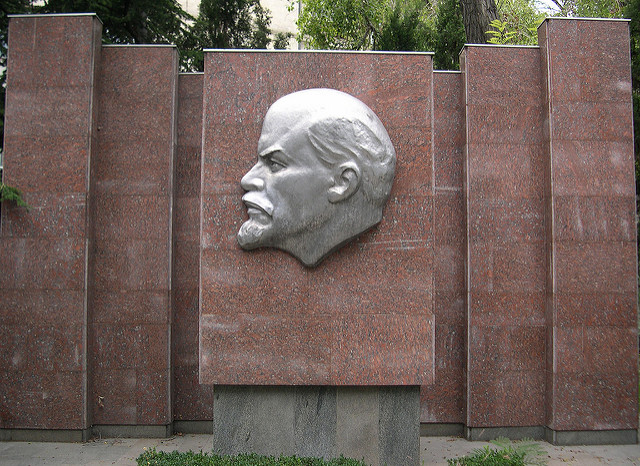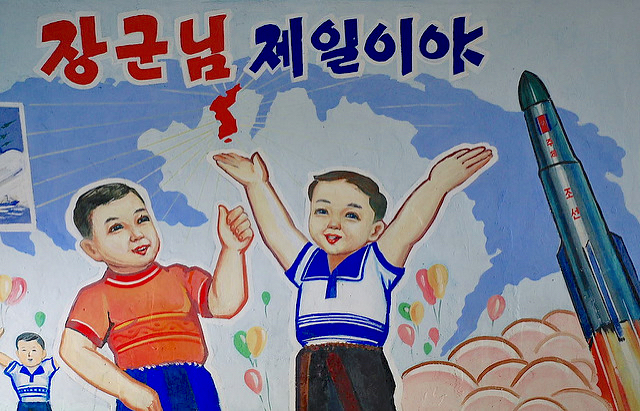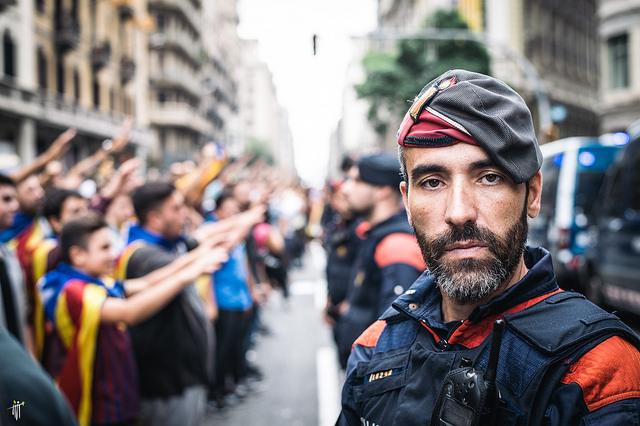On a hot Monday, I made a call to a woman who was a bridge between Eduard Shevardnadze, the Soviet Foreign Minister during the Gorbachev era, to check if the bad news about his possible death was real. “Helena, its true..” She wept. “He died at 12 today.” Shevardnadze was 86. His death ended what was for many Georgians the bad period for the small Caucasus country, a sunny region which was a leftover of the careless Soviet system, which just like its sister republics, turned into a run-down civil-war state overnight almost immediately after the fall of Communism in 1991.
Shevardnadze continued to try to improve the struggling war-torn independent republic, but organized crime syndicates were very powerful and often he was standing alone in his struggle. He brokered deals to bring oil pipelines through the country and gradually these actions led to the population receiving, sporadically, gas and oil, However, this was not enough for Georgians, and he made a dignified resignation following the bloodless Rose Revolution, bringing to power a very pro-western government led by Mikheil Saakashvili. Indeed, stranded at home since 2003, in his Krtsanisi residence, one of the most desirable green areas of the capital, Tbilisi, Shevardnadze remained a popular person to visit for foreign visitors and reporters, wanting to hear his words of wisdom.
In addition, there were simply well-wishers who remembered his kindness. It was Marina who was organizing those meetings for him. I was glad I managed to see him just a few years ago, but Shevardnadze appeared weaker and frailer than ever the last time I photographed him. But it was always pleasing to see the man who reshaped the history of the world – for better or worse, depending on your point of view. “He had a super brain like a computer” and his dedication to his job will be remembered as “heroic.” His chief of staff and closest aide Peter Mamradze once told me in an interview about Shevardnadze. He began his career in the 1970s as a Communist Party boss in Georgia, which was then a Soviet republic. In 1985, as Gorbachev’s surprise choice for the post of foreign minister, he helped lead policy initiatives that would end the Cold War.
In our last interview, he told me that Gorbachev wanted nothing but, “Socialism with a Human face” and helped to dismantle the once powerful empire, he continued “Sometimes, it was hard with Gorbachev, he did not listen to me sometimes,” Shevardnadze laughed. He resigned as foreign minister in 1990, saying in his famous speech that he believed that he had precise information that dictatorship lay ahead. Eight months later, in August 1991, a group of Soviet hard-liners staged a coup against Gorbachev, but it failed, triggering the breakup of both the Communist Party and the Soviet Union.
Shevardnadze’s return to his homeland, after the fall of the first post-Soviet elected president Zviad Gamsakhurdia, was not an easy task. Gamsakhurdia was removed after a coup d’etat and devastating civil war. He led the state for 11 years after that, while constantly being reminded of that period as his sin. Gamsakhurdia supporters led by the late president’s wife Manana Archvadze always condemned him as the evil who brought the country to its knees, by killing the chosen president and losing territories to Russia. Scores of Gamsakhurdia supporters, mostly women, religiously shouted abusive names outside his residence even after he resigned and decided to spend his time next to his beloved wife’s grave, writing books and his memoirs. The day that Shevardnadze died, people came to pay their respects, including members of the current Georgian government, priests and close relatives.

Others were not so polite. Groups of emotional women still believed that he was the Kremlin-managed stooge who orchestrated the end of the real Georgian state and is still guilty, even dead. “He is a criminal, he should have never been left as a free man, him and his allies must be tried for the crimes he committed overthrowing the legal government in 1991 and then killing Gamsakhurdia.” Without a doubt Shevardnadze shook the world’s politics. World leaders like Reagan and Gorbachev, bowed down in front of his abilities. The Berlin wall was demolished, then a truly unimaginable fact, thanks to him. Georgian director Tengiz Abuladze, released a scandalous film exposing tyranny and the Stalin-era labor camps in 1987.
But Shevardnadze was nothing but a failure at home. For many like Zurab Guruli, who fled the country in 1990s, he will be remembered as a Soviet statesman and fanatic Communist, a ruthless ruler and, author of the notorious phrase “The sun rises from North” and someone who invited the Russian military army into Georgia. At the same time, Shevardnadze signed the historic energy route agreement with Azerbaijan. However at home, he failed to help the country to fight corruption and to heal the wounds from the Abkhazia and South Ossetia conflicts. “Shevardnadze did not lose Abkhazia,” Mamradze said adding that it was Shevardnadze who stopped the bloodshed in South Abkhazia, where thousands of Georgian rebel troops fought back the central government’s army, resulting in the defeat of the central government. Then there was the uprising in western Georgia, this time by Gamsakhurdian loyalists.
There were two assassination attempts on Shevardnadze, The bodyguard who has now retired did not want to be named recalled to me in an interview back in 2011 how Shevardnadze escaped with minor injuries, “I clearly remember the first one, when the nearby buildings were shaken by an explosion in the summer of 1995 when his escort was leaving his office premises, The second one was carried out late night when he was returning home,” The second attempt in 1997 was more like a “military operation”, rather than just an assassination, he said. Shevardnadze’s escort was driving him home when a group of militants fired several anti-tank missiles at his bulletproof Mercedes. In the gunfire that followed, two of Shevardnadze’s bodyguards were killed. “The driver did a miracle as he managed to drive away from the scene although his car had been hit, yet again he took it very peacefully. He had not moved in the car,” his bodyguard said.
Another bulletproof Mercedes was given to him as a gift from the German government following the failed assassination attempt. The US, and other Western countries, continued to support Shevardnadze, until the Rose Revolution. In our last interview, we talked about Russia and the worsening relations between the two neighbors. Shevardnadze disliked his young chosen politician Saakashvili and blamed him for this. However, he believed that Russia had already made a huge mistake by recognizing Abkhazia and South Ossetia, following the 2008 armed conflict. “Why did they do it? It’s a huge failure for them, what about Chechens? What about Tatars? What about other nations that may outnumber Abkhazians and South Ossetians?” he said, shrugging his shoulders, in 2011.
Until the end ,we saw interviews and opinions from him stating that Russia would talk differently when the government changed. Shevardnadze’s memoirs,“Thoughts on the Past and the Future,” were published first in Georgia in 2006, and later in Germany. Mamaradze recalls that Shevardnadze had lost control over the situation and corruption at the end of his tenure because of his personal problems like his beloved wife Nanouli’s terminal illness, who died in 2004 and was buried in the garden of the residence. “He wanted to leave and let the young people come to power but he was blackmailed to stay,” Mamradze said.
I actually never liked his most popular world-known nickname the “Silver Fox,” and preferred more his home name “Babu”, as a sweet granddad. “He will be remembered as the leader who kept his country stable, but still he was a Soviet career builder, and a typical opportunist of his time,” Alex Rondeli said. “He could not fight corruption and he was afraid to proceed with the reforms, but it was not just his fault.” “`I did nothing wrong, ” These were his last words to me when asked how he felt about of the demise of the Soviet Union and everything else he did. “It was unavoidable, it was the correct step, and how can it stay like that? So many different people… it was an empire. Every empire collapses sooner or later. It has collapsed sooner than I expected, to be honest!”
Photographs courtesy of CBB143 and Wikimedia/Novosti. Published under a Creative Commons license





